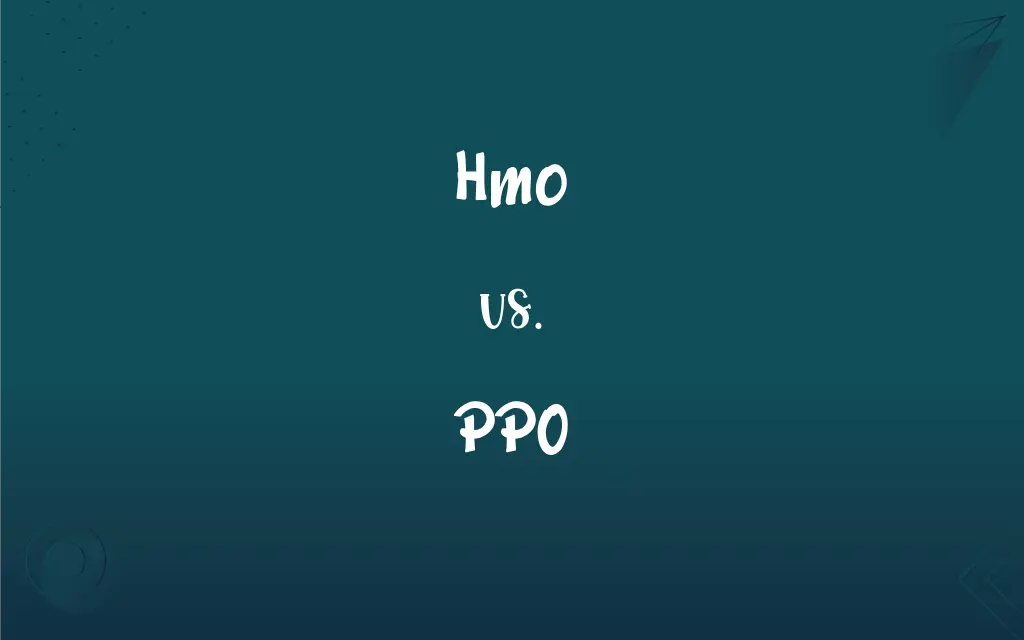HMO vs. PPO: What's the Difference?
Edited by Janet White || By Harlon Moss || Updated on October 10, 2023
HMO (Health Maintenance Organization) typically restricts members to use healthcare providers within its network, while PPO (Preferred Provider Organization) allows members to use providers outside its network, usually at a higher cost.

Key Differences
HMO and PPO represent two distinct types of health insurance plans in the United States, each with its own approach to healthcare access and costs. HMO, or Health Maintenance Organization, emphasizes a network of doctors and healthcare providers with whom they have contracted, which effectively means that members are typically required to choose healthcare providers within this network to avoid additional costs. Selecting a primary care physician (PCP) who coordinates their care and provides referrals to specialists is a staple characteristic of HMO plans.
Conversely, a PPO, or Preferred Provider Organization, presents an alternative healthcare plan design offering a bit more flexibility regarding which healthcare providers their members can see. Unlike HMO, PPO plans do not necessitate choosing a primary care physician and do not require referrals to see specialists, thereby offering more direct access to specialist doctors without having to consult a primary physician first. However, seeing providers outside the PPO network is generally more costly, a key consideration in selecting a plan.
HMOs are often highlighted for their affordability compared to PPOs, primarily due to their structured approach to healthcare management. Cost efficiency is achieved by focusing care within a network of doctors, where costs can be more easily managed and controlled. This methodology naturally incurs limitations on flexibility, particularly when it comes to seeking care from specialists or healthcare providers out of network, a constraint that could be challenging for individuals who require diverse specialist input.
In contrast, PPOs are typically associated with higher premiums and out-of-pocket costs but offer the notable advantage of flexibility, making them a potentially suitable option for individuals who prioritize the ability to directly access specialists or who require healthcare services out of their local area. This flexibility, while typically more expensive, provides broader options for those with more complex or specialized healthcare needs, underlining the PPO's value in contexts requiring varied specialist input.
It's worth noting that both HMO and PPO plans have respective merits and limitations, necessitating a careful assessment of an individual’s or family’s healthcare needs, budget, and priorities when selecting a health plan. It’s often crucial to weigh the importance of flexibility against cost and to consider the range and type of healthcare services that might be needed when deciding between an HMO and a PPO.
ADVERTISEMENT
Comparison Chart
Network Restriction
Strict, limited to contracted providers
Flexible, can use out-of-network providers
Primary Care Doctor
Required
Not required
Specialist Referral
Required
Not required
Cost
Typically lower
Typically higher due to flexibility
Coverage Outside Network
Usually not covered, or limited
Covered, but at a higher cost
ADVERTISEMENT
HMO and PPO Definitions
Hmo
An HMO emphasizes using a network of specific healthcare providers to manage costs.
My HMO provides affordable options within a specific network of doctors.
PPO
PPOs do not necessitate selecting a primary care physician to coordinate healthcare services.
With my PPO, I appreciate not being tied to a specific primary care physician for my health needs.
Hmo
HMO plans often require referrals to see specialists within the network.
My dermatology visit needed a referral from my primary doctor due to my HMO policy.
PPO
PPO plans offer more flexibility by allowing members to visit any healthcare provider.
My PPO lets me choose specialists without needing a referral from a primary doctor.
Hmo
HMOs usually necessitate selecting a primary care physician to coordinate care.
In my HMO, my primary care physician refers me to any specialists I need to see.
PPO
PPO members can directly access specialists without obtaining referrals.
I scheduled a visit with a neurologist directly, a benefit of my PPO plan.
Hmo
HMOs typically feature lower premiums and out-of-pocket costs than PPOs.
I chose an HMO because it offers lower monthly premiums and minimized my expenses.
PPO
PPOs often have higher premiums and out-of-pocket costs than HMOs due to increased flexibility.
Even though my PPO is a bit pricey, the flexibility of choosing any doctor is valuable to me.
Hmo
HMO members usually have limited or no coverage for out-of-network services.
My HMO plan did not cover the out-of-network specialist, so I paid entirely out-of-pocket.
PPO
PPOs provide coverage for services rendered by out-of-network providers, albeit often at higher costs.
My PPO covered a portion of my out-of-network dermatologist visit, although it was costlier than in-network.
Hmo
A health care plan in which medical costs are controlled by limiting services to a specific network of medical personnel and facilities and usually by requiring referral by a primary-care physician for specialty care.
Hmo
A health maintenance organization; a form of group health insurance that entitles members to services of participating hospitals and clinics and physicians.
Hmo
Group insurance that entitles members to services of participating hospitals and clinics and physicians
FAQs
How does a PPO provide healthcare coverage?
Preferred Provider Organizations (PPOs) provide healthcare coverage with more flexibility in choosing providers and specialists.
Do HMOs usually cost less than PPOs?
Typically, HMOs have lower premiums and overall costs compared to PPOs.
Can I see out-of-network doctors with a PPO?
Yes, PPOs allow you to see out-of-network providers, often with higher out-of-pocket costs.
Are preventive services typically covered by HMOs?
Yes, HMOs often cover preventive services like vaccinations and screenings.
How does one find in-network doctors in an HMO?
To find in-network doctors, members can utilize the HMO’s online provider directory or contact customer service for assistance.
Is a referral needed to see a specialist in an HMO?
Generally, yes – HMO plans usually require referrals from a primary care physician to see specialists.
Do PPOs cover out-of-state medical services?
Often yes, PPOs may provide coverage for out-of-state healthcare services, especially emergency ones.
What is the primary disadvantage of an HMO?
HMOs can be restrictive regarding which doctors you can see and usually require referrals to specialists.
Is a primary care physician required for an HMO plan?
Yes, HMO plans typically require members to select a primary care physician (PCP).
How do out-of-network costs compare between HMO and PPO?
PPOs usually cover a portion of out-of-network costs, while HMOs often provide limited or no out-of-network coverage.
Is emergency care covered in an HMO?
Yes, emergency care is typically covered in HMOs even if provided out-of-network.
How does prescription medication coverage compare in HMOs vs. PPOs?
Coverage can vary widely; both HMO and PPO plans may have prescription benefits, but specific coverage details depend on the plan.
What is an EPO and how does it compare to HMO and PPO?
An EPO (Exclusive Provider Organization) combines elements of both, offering a network like an HMO but without the necessity of referrals like a PPO.
How does one change primary care physicians in an HMO?
To change primary care physicians in an HMO, members typically contact customer service or utilize an online portal, depending on the provider.
What does HMO stand for?
Health Maintenance Organization.
What is the principal advantage of a PPO?
PPOs principally offer flexibility in choosing healthcare providers without requiring referrals for specialists.
Can PPO members visit specialists without a referral?
Yes, PPO members can typically visit specialists directly without needing a referral.
Are family members covered under PPO and HMO plans?
Both PPOs and HMOs offer family plans, but coverage details and costs can vary widely between plans.
Is mental health coverage typically included in PPO plans?
PPO plans often include mental health coverage, but specific benefits and network restrictions vary by plan.
Do PPOs offer nationwide coverage?
PPOs may offer nationwide coverage, particularly for emergencies, but exact provisions vary between plans.
About Author
Written by
Harlon MossHarlon is a seasoned quality moderator and accomplished content writer for Difference Wiki. An alumnus of the prestigious University of California, he earned his degree in Computer Science. Leveraging his academic background, Harlon brings a meticulous and informed perspective to his work, ensuring content accuracy and excellence.
Edited by
Janet WhiteJanet White has been an esteemed writer and blogger for Difference Wiki. Holding a Master's degree in Science and Medical Journalism from the prestigious Boston University, she has consistently demonstrated her expertise and passion for her field. When she's not immersed in her work, Janet relishes her time exercising, delving into a good book, and cherishing moments with friends and family.































































